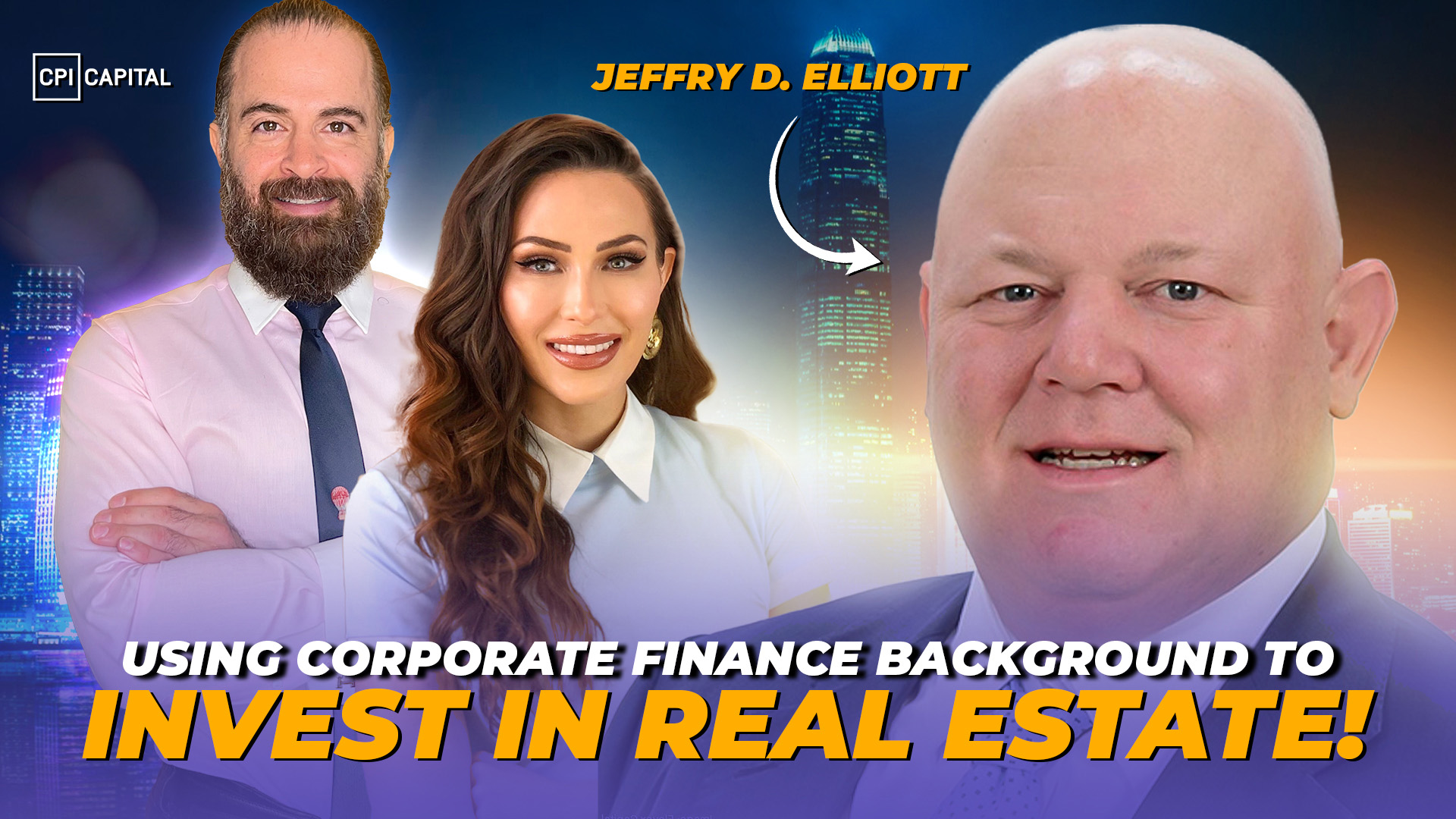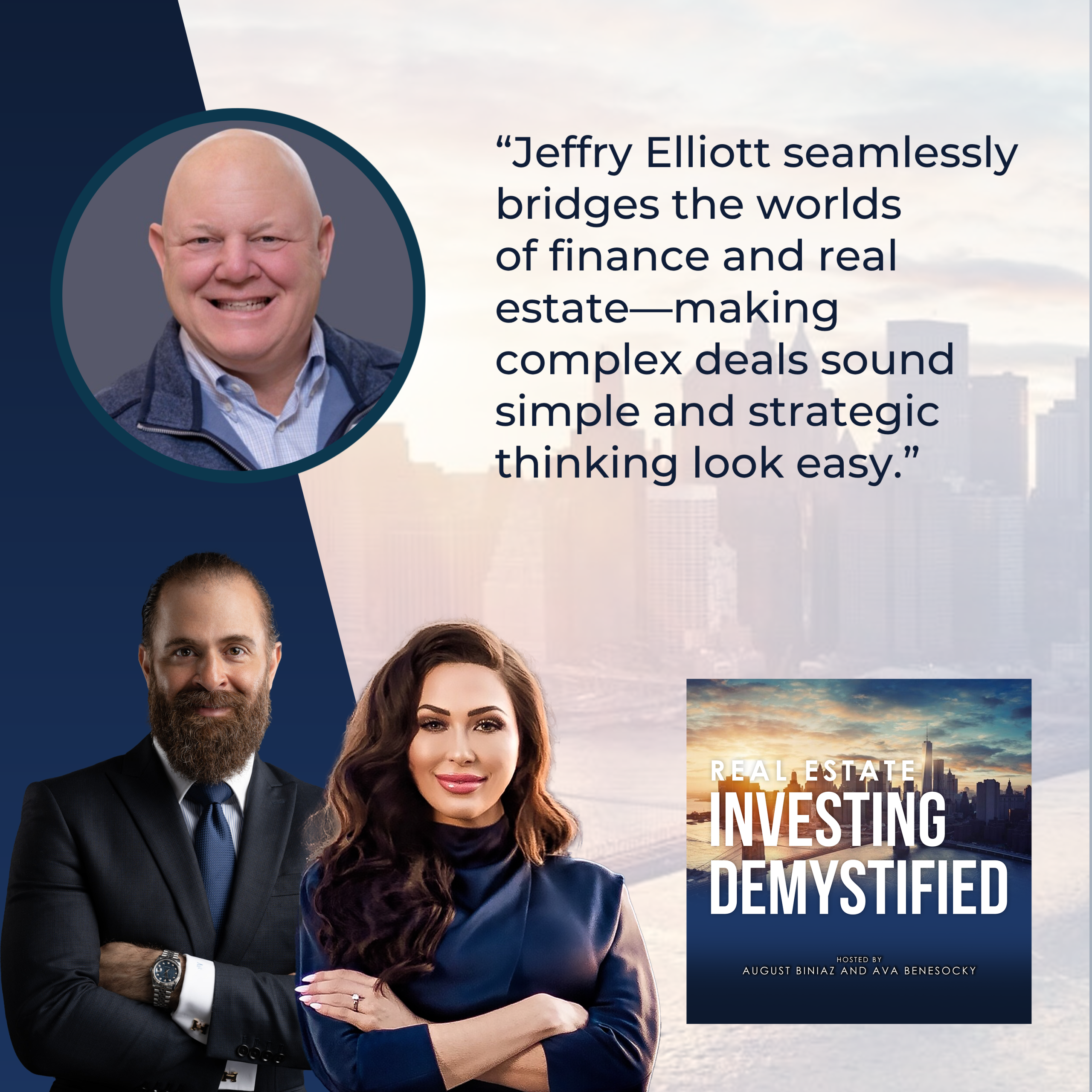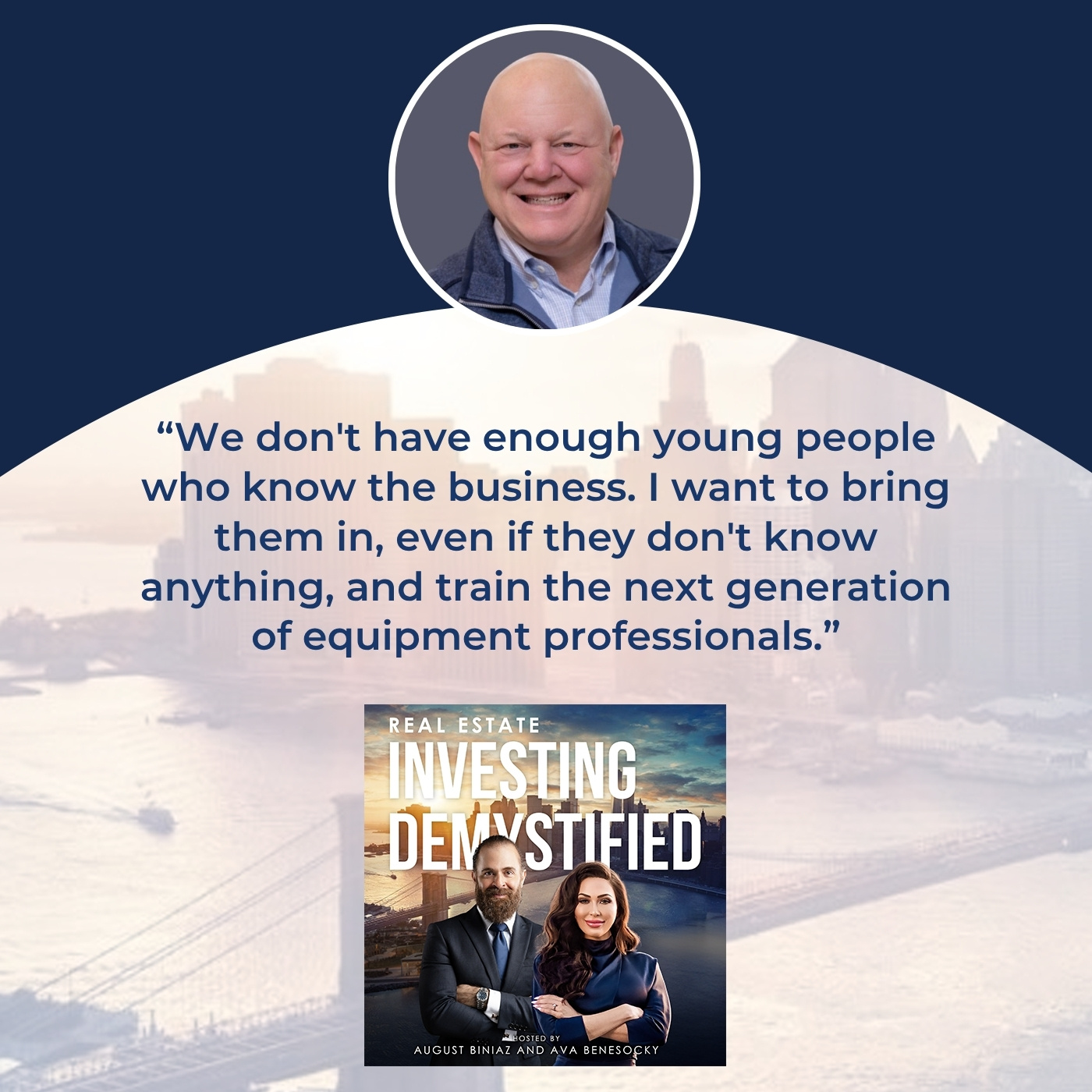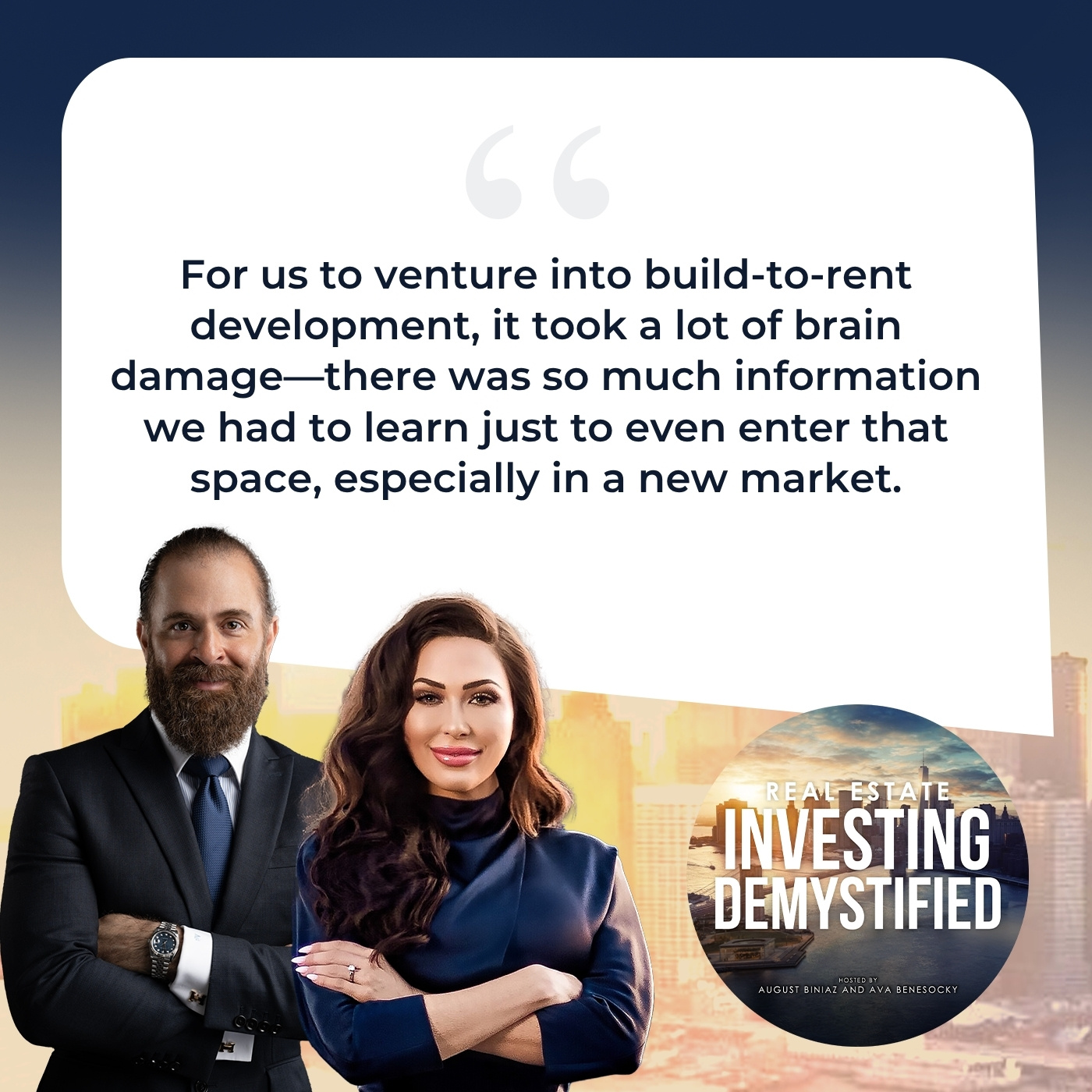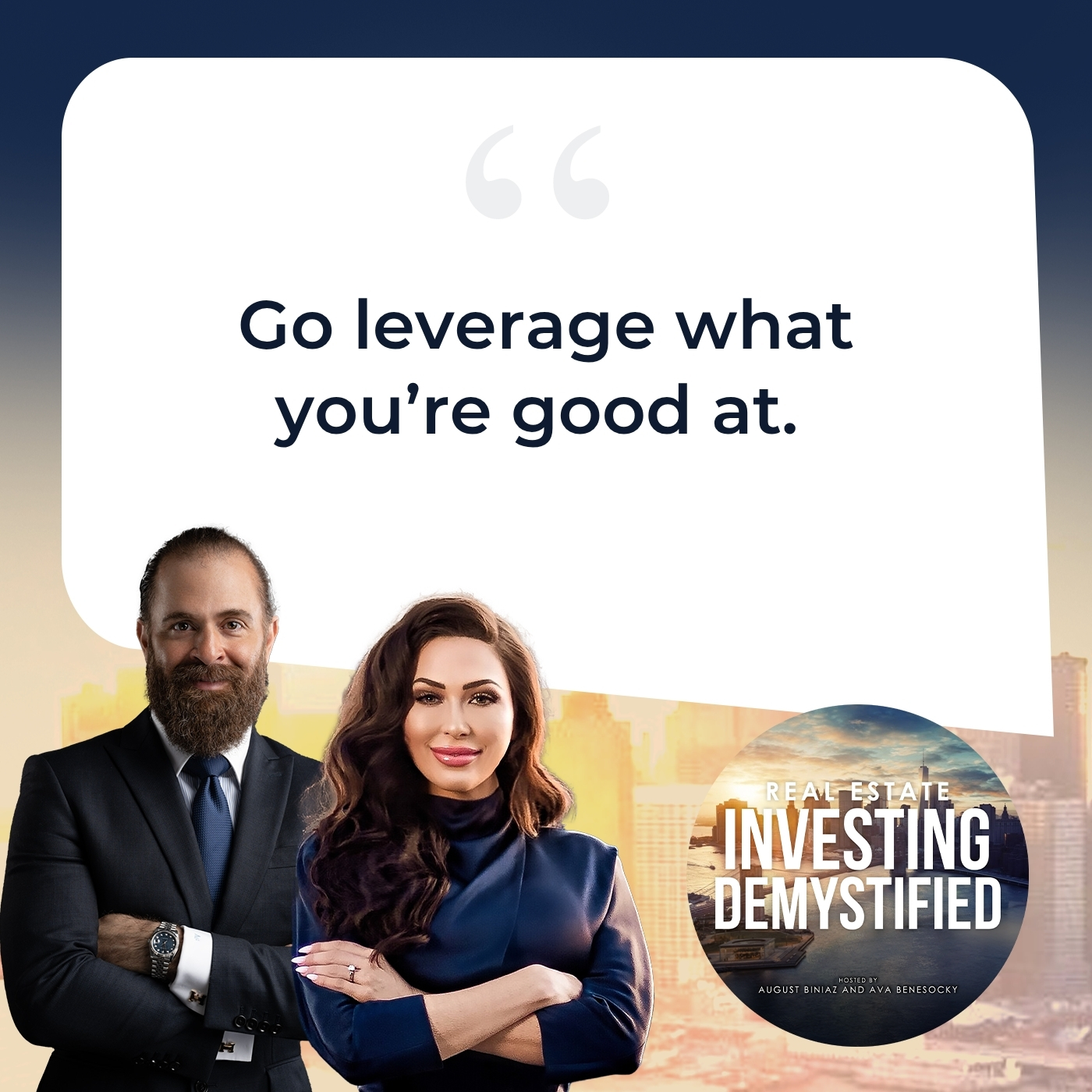Corporate finance in real estate investing isn’t just about numbers—it’s about vision, structure, and long-term play. In this powerful conversation, Jeffry Elliott, Founder and CEO of Elevex Capital, shares how his extensive background in banking and corporate finance became the springboard for a thriving real estate and equipment finance portfolio. From navigating downturns to identifying underutilized assets and seizing value in overlooked markets, Jeffry breaks down what it really means to cross over and apply structured finance principles to real-world investment strategies.
Get in touch with Jeffry Elliott:
If you are interested in learning more about passively investing in multifamily and build-to-rent properties, click here to schedule a call with the CPI Capital Team or contact us at info@cpicapital.ca. If you like to co-syndicate and close on larger deals as a general partner, click here. You can read more about CPI Capital at https://www.cpicapital.ca/.
#avabenesocky #augustbiniaz #cpicapital
—
Watch the episode here
Listen to the podcast here
Important Links
- Elevex Capital
- Barbarians at the Gate
- King of Capital
- Jeffry Elliott Email
- Jeffry Elliott on LinkedIn
About Jeffry Elliott
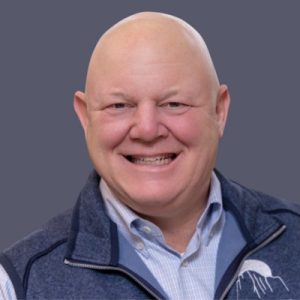
Mr. Elliott began his banking career with Security Pacific, a Subsidiary of Bank of America in 1993 in the consumer finance division. Prior to Huntington, Mr. Elliott was Vice President with U.S. Bank as Manager of the Indirect Funding Group; he joined Huntington in 2001 to build a new equipment finance division, which he helped grow for 23 years to one of the largest bank owned equipment leasing companies in the US eventually becoming President.
Mr. Elliott specializes in analyzing equipment finance related financial contracts as it relates to wholesale lending activities or merger & acquisition transactions. He is an active participant in the syndication markets, both on the buy and sell side of equipment leasing and loan transactions. Project Finance is another area of focus, primarily in the renewable energy markets working on back leverage term loans, solar sale-leaseback, and tax equity transactions.
Mr. Elliott holds a Bachelor of Science degree in Accounting and Finance from the Richard T. Farmer School of Business at Miami University in Oxford, Ohio and a Master of Business Administration from the Williams College of Business at Xavier University in Cincinnati, Ohio. Mr. Elliott is a Certified Lease Finance Professional (“CLFP”) and was formerly an active member of the CLFP Board of Directors.
Mr. Elliott was formerly involved with the Mid America Association of Equipment Lessors (“MAEL”), where he served as Vice Chairman/Board of Director. Currently he is Treasurer and a board member of the Equipment Leasing & Finance Association. Mr. Elliott is a former Chairman of the Equipment Leasing & Finance Foundation and former Chairman of the Research Committee and a member of the Board of Trustees.
Mr. Elliott is a current board member of the Association for Governmental Leasing and Finance (“AGLF”). Mr. Elliott is also a retired member of the Ohio High School Athletic Association as a High School Basketball & Football Official. Mr. Elliott enjoys the pursuit of the culinary arts, wine appreciation and collecting and golf, where he is a member of Avon Oaks Country Club. He resides in Bay Village, Ohio with his wife and two children.
Jeffry Elliott – Crossing Over: Using Corporate Finance Background To Invest In Real Estate!
We’re happy to be back.
That’s right. Happy to be back. Not only on the show, but physically back on the North American continent. We were on a little vacation and we went to Turkey for a small vacation. As soon as our plane took off, the whole world fell apart. There was a plane crash in India. Iran and Israel went to war. There were missiles literally going over Turkey from Iran to Israel and planes going back and forth. We left our kids behind.
This Mommy of two was having a little bit of anxiety. Every day, I was one day alive.
We just wanted to make it back. It was great. We traveled through Turkey and went to Istanbul, which is interesting.
It was a lot, close to 16 million people. We actually had dinner on a yacht and we were literally right between the two continents of Europe and Asia. We actually visited both continents in one day. That was pretty cool.
That was cool, going back and forth. We went to Cappadocia, on a balloon.
It was magical.
There was also a balloon crash, though. That was another thing that was scary. Not while we were there but in a different location. It was great, but I’m not sure what they have in the water in Turkey, because when I came back, all of a sudden, I have a full head of hair. I’m not sure what happened there. I’m not sure what it is. Drink a lot of water when you’re in Turkey, because all of a sudden, you might come back with a bunch of full head of hair.
That’s where we are. Yeah, let’s bring the attention back to our show. Our show is Real Estate Investing Demystified, but we’ve been somewhat diverse, bringing in different guests. This episode’s guest is going to put a focus on an industry when it comes to equipment financing in the us. Now, equipment is a broad term, so we’re going to learn more about how this business is done. He’s also got a firm that does the financing itself. We’re going to learn about if there are opportunities to be able to invest with him as well. Maybe you can tell our audience a bit about our guest.
I would love to. Joining us is Jeffry Elliot. He’s the Founder and CEO of Elevex Capital, an innovative commercial equipment financing firm serving businesses across North America. With over 30 years in banking and finance, including a long tenure year at Huntington Bank, Jeffry is a recognized leader in equipment leasing, project finance, and renewable energy funding. He is also a Certified Lease Finance Professional and active board member in several national finance associations. Welcome to the show, Jeffry. Happy to have you here.
Thanks for having me.
The Trillion-Dollar Pulse: Inside Equipment Financing’s Economy
I touched on this before our show, but equipment financing, in particular in the US, one of the top industrial countries in the world. Obviously, with China these days, the US might be behind China when it comes to industries, but manufacturing, construction, agricultural equipment is a big part of that. With yourself financing the equipment, you most probably have your finger on the pulse of the economy. How is your business doing in what you do?
Yeah, our business is doing quite well. The equipment financing industry is in the US is a trillion-dollar-a-year business. Matter of fact, $1,000,000,000,002. A lot of people don’t know that it’s that large, but there are lots of different diversified types of equipment finance markets. Just think of all the different industries, including federal and local governments use equipment. Virtually every business or government uses equipment. They need to finance that equipment one way or the other. Our markets are huge and diverse and so there’s always something going up and something going down.
Our industry is very entrepreneurial and the players in that industry try to diversify and find ways to always be on the up slope with some part of the economy. Trucking has been depressed over the last couple of years. It’s coming back now a little bit here and there. That was an area that things went down. Other things like renewables were doing really gangbuster or now you’re seeing more investments in oil and natural gas as the new administration’s shifted priorities to different things.
Those are all different industries. Different players play in different things. My business at Elevex is pretty diversified. We do small businesses. Think of the local retail grocery store maybe on the corner of your neighborhood where you live. We might finance all the shelving or all the POS machines and the cash registers that they use. We do things for Walmart or Cisco or Facebook, really large corporations. We finance their essential assets.
Sometimes we do renewable energy projects for those large companies like Amazon or utilities and governments that want to invest in those types of projects. Governments borrow too. The federal government does, again, energy efficiency projects within their buildings. Did one years ago for the IRS redoing all their boiler chiller windows, LED lighting, all those things for that building.
There’s a little bit of a real estate piece in our business in the sense that we do a lot of the improvements, the tenant improvement type stuff that is related to equipment like HVAC. That is a great example that you see with small businesses all the way up to large. There are other things in there that you wouldn’t necessarily think of. Windows, toilets, doors, the full suite of those things.
They can be done under lots of different structures, typical leases, municipal leases CPACE loans, very focused in that space. You see some equipment finance players developing expertise in those areas. Other things, we go down to local governments, school buses and police cars, things like that. A lot of financing goes on there. In your general business, think of us when you drive around all those trucks and trailers on the road, we’re financing those.
Our number one asset is probably trucks. When there’s a up and down in the trucking industry, which happens all the time, we follow that. The smart players in our industry sell assets when it’s at the peak and then they buy assets when it’s at the bottom. They know when those channels are coming, they can watch the flow of goods and what’s going on in the economy.
We’re not devoid of risk in international. When we went through the supply chain crisis, that hurt our business a lot. That’s probably more than a normal recession that hurt our business because if you can’t get the equipment to finance, it’s hard to finance equipment. Now what it did do, and amazingly, is we’re also involved in used equipment and we sell used equipment when we get it back.
Just like a lease of a car, sometimes you decide you don’t want that asset and you hand it back to us and we sell it. During that time period, things were up 2 to 10 times in value because you couldn’t get a new truck per se. In ’22, a five-year over-the-road truck would’ve been $25,000, $30,000 after five years, normal wear and tear, it was like $80,000 just because of the demand. In our business, that can be really good because we’ve got those assets coming off and we can make gains.
Just because it's not movable, doesn't mean it's not valuable. Share on XCan you also differentiate between attached equipment? You talked about shelving and HVAC and equipment, which are not like trucks. Is that totally different? Somebody could jump in a truck and drive it away, but an HVAC system, you can’t really do that to it as part of the building, part of the structure.
Let me back up a little bit and tell you how we look at those assets and then I’ll tell you the difference. In our business, we have what we call asset managers. Asset seems like a common term, but it’s really specific in our industry. They are people who value the equipment and they sell the equipment when we get it back. Every time we do a deal, there’s some level of asset management applied to that transaction.
If it’s trucks, we look at if we’re going to do five-year trucks, what are those trucks worth at the end of five years? We’ll structure our deal around that amortization and what it’s worth. If it’s HVAC and it’s going to be tied into a building like a potato chip manufacturing line that’s just dedicated to make potato chips drilled into the floor into a manufacturing facility food bank, that’s really an in-place value.
It goes along with the real estate. We assess the situation based on the usage and the type of equipment it is and how liquid they can trade. Just because it’s not movable doesn’t mean it’s not valuable. Sometimes it does, sometimes that hurts the value because it’s really specific and only certain businesses can use it. Sometimes, that equipment and that building around it are sold together because that’s a plant that can’t work with one without the other. Got to have a building around the equipment and the equipment’s got to be there or doesn’t work.
A good example of that is like cold storage. There’s a lot of automation equipment in a cold storage facility. Those are popping up everywhere. You may have one popping up in your town. There’s not enough of those in North America and they’re really popular for all kinds of things. Medicine, food, of course, all kinds of things that need to be stored cold. They’re automating them so you don’t need as many people to run them. They do some processing in there, not just putting boxes on a shelf. There was one that we involved in in Seattle that was processing fish, so it processed fish, then froze it and packaged it, and then it was there, and then trucks came and moved it in and out.
Attached Vs. Unattached Assets: Valuing Equipment In The Real World
Could you also make a differentiation between, so let’s say cold storage facility is in need of updating all their security cameras, for example, or something. I’m just making stuff up. What would have them come to a firm like yours for financing or go to the actual supplier of the security equipment and get financing directly from them? Where do you come in?
Yeah. Generally, in our world, there are banks, independent finance companies, captive finance companies, brokers, and then all kinds of service providers. We’ll leave out the service providers and the brokers for now. Banks finance their customers’ equipment needs, and independents finance their customers’ equipment needs. They’re not banks, but they serve a market where the banks pull back from smaller companies a lot of times, but just companies that are don’t fit well within the bank credit policies. They generally take a little bit more risk and have more flexibility and structuring and then captives is what you’re talking about.
If you take a John Deere, John Deere has its own finance company and they finance, I would say, a majority of their own assets that they sell. At any one given time, you’ve got a large farm that’s buying John Deere equipment, they’ve got a big relationship, say with one of the big money center banks, they might get a better deal just through their bank and want to finance it with their bank. There’s plenty of equipment that John Deere will sell that someone else will finance.
As it goes down, sometimes John Deere doesn’t want to finance or they’ve done too much to that customer and then somebody else comes in like an independent. I’ll use John Deere’s example because it’s a good one. We do a lot of agricultural equipment and John Deere’s great equipment. With smaller farms that John Deere just doesn’t view as strong enough for what they want to lend to, we’ll come in and do it or they’re buying a used piece of John Deere equipment, so we’re financing on the used market. We’ll finance that for them. That’s why it’s this entrepreneurial way of finding business.
We have lots of different origination models that are both direct and indirect. On top of it, captives sometimes don’t want to finance. They don’t want on their balance sheet. All these long-term receivables from leases and loans. Behind these captive finance companies are guys like me, independents or banks.
I’ll just use John Deere, but John Deere doesn’t really do this, but John Deere, there’s really a bank behind it. Think about when you go to the car dealership, you might take an application. Honda might be one of them, but they send it to X, Y, Z bank and so on and so forth. I might send it to five different locations. We’re one of those, but sometimes we’re the lead player of running that captive finance arm for that seller of equipment or dealer of equipment. That’s a big channel of origination for us. We call customer direct as well.
Lease Vs. Loan: The Ultimate Equipment Financing Crash Course
Jeffry, maybe you can give us a crash course on how equipment financing works. We’re obviously very familiar with financing and loans on real estate. Is equipment financing very similar?
It’s similar, but there’s less paperwork. Let’s put it that way. A lot less things to do, a lot less rules. Leases and loans can be interchangeable on any given asset. It just depends if you really want the features of a lease versus the features of a loan. On a loan transaction, you own the asset and on a lease transaction, you’re just renting the asset.
On a lease transaction from a tax perspective, the lessor, meaning my company or the bank or the captive, depreciates the asset, and then we pass on the value of that depreciation, that tax write off in the form of a lower payment to the customer. If you want lower payments, it’s not necessarily about the interest rate implied in the transaction. You can get lower payments because you can give up the tax benefit of depreciation.
You don’t really lose anything as a customer on that end because the rental payment is expendable. It is expensed from a tax perspective. You have the same expenses, but you pass along a benefit to us. We can pass along a benefit to you in the form of a lower payment. There’s also lots of structuring, meaning maybe you want zero payments in the winter and then payments for nine months out of the year, or you need high-low payments. Loans are typically very simple and there’s not a lot of customization in them, meaning we can do that on a loan too, but that’s usually done on an equipment finance platform, not a typical bank platform. We do lots of different high-low structures, a lot of payment upfront and not as much payment later or the other way around.
There are lots of structures and then there’s obsolescence and returnability. You don’t have to pay for the whole asset. Sometimes you’re paying 70%, 80%. On some assets like aircraft, you might pay 40% and then hand that aircraft back and go get a new one or not get one at all. You can use the equipment for the time you need to use it and hand it back under a lease scenario based on the structure and the contract that you do.
A lot more flexible growth companies that have cashflow concerns. We can structure our payments around their cashflow and help them get the assets they need to take that next step forward. Two things happen in equipment finance. You’re either replacing an asset or you’re adding an asset that’s going to increase revenue. All equipment wears out, so eventually you got to replace it and get a new one and if you want to grow, you’ve got to bring in more essential assets to grow your revenue. Most of what we’re doing is revenue generation for all the entities that we finance.
Unlocking Growth: Elevex Capital’s Client Acquisition Secrets
This is a silly question, but how would they find your company? How would they find your company to be able to have the flexibility of working with somebody, like if they get shut down?
I’ve been in the industry for 30-plus years. Right now, it’s because they know me, and a few of my people that I’ve hired. I’m also doing a lot of social media podcasts, things like that. We’re going to be doing more and more of this social media outreach. We have different marketing campaigns, and then we have what we call vertical business segments.
I hire specialists in certain markets, so they could be an equipment type or an industry. Let’s just take rail. I have some specialists now that just focus on the rail industry, so they know all the railroads and all the shippers that own rail cars, and they go around and find deals in that industry and then bring them to us and then we structure and finance them for them.
We have we’ll have people do that in corporate aviation, marine, agriculture, renewable energy, legacy oil and gas markets, all types of different things. We have channels like vendor finance. They go try to find sellers of equipment and set up financing programs for them. Specialized programs. They’re not focused necessarily on an industry or equipment type.
They’re focused on manufacturers or dealers of equipment, and so we get channels that way. We have direct, so just salespeople that have a lot of customer context that you’ll run into playing golf or wherever you go and all your networking. Everybody has CapEx needs and we find out their CapEx needs and we’re a source for them to finance things that maybe their bank doesn’t finance or what have you.
Elevex itself, you’ll see more outbound reach out to customers directly as we keep growing and building our sales force and our vertical channels. We usually find them, sometimes they find us, and we have advertising and things like that, but you haven’t seen a lot of that yet. We try to get in at the place of acquisition, meaning when they’re thinking about buying a piece of equipment, how are they going to pay for it? Are they going to pay cash or are they going to finance it?
If they’re going to finance it, we want to be there at that time period. We find ways to be in that consumer or that business’s mind at the time that they’re making that decision and say, “Can I really afford this one?” “If I finance it, I can.” “What offer can Jeff make to help us get this thing done?” That’s the place we want to be at.
I think you might have already answered my question by your response just now, but I was you talked about asset management earlier. Your business is so diverse, the type of clients you have and the expertise needed in each one of those fields, I guess you use these external professionals. For example, in our space, for CPI, we were very multifamily-focused firm, but now we’re also doing build-to-rent deals in different markets. We were hyper-focused in Tampa, but now we have an asset that we’re building in San Antonio, and then we have another deal that’s under contract in Dallas.
Start something new, do some of the things you can't do. Share on XFor us to be able to venture into that other asset class, which is built to rent development, it was so much brain damage and there was so much knowledge and information we had to gain to be able to even be involved in that space and also in a new market. When looking at yourself, when you’re about to lend to somebody that’s in the aerospace industry or somebody who’s in the food industry, there needs to be a level of expertise to say, “What’s the risk associated? Can this this borrower pay it back? What type of leverage should we lend to them?” I guess you bring in these experts.
Yeah. Let me go through. There’s a few things that happen. If you’re doing it right, you hire people with a lot of experience doing a wide range of equipment types and industries. However, they’re just more about the process. A lot of these are a SA-certified appraiser-type people. They may actually be certified or just as good as a certified appraiser. They really understand how to value things and the process.
We buy lots of guides, black book, blue books, all these things that have access to historical values of equipment, and then they build up a network of contacts to call whenever they get. We were looking at a Gulfstream 650 private jet. Right away, my asset manager goes, “I’m going to call this guy,” I don’t even know who it was, but he’s going to help me see what the value of that asset is.
Should we play in it? What level should we play in it? Private jets are very volatile in terms of their valuation. There are all kinds of people and they all know each other, all these asset guys, and they all trade information with each other, usually for free, and then there are appraisers. When we get in the big ones, we’ll hire an actual appraisal done, say, on rail cars or aircraft. At certain levels, you do that.
On little stuff, so take like forklifts or trucks, we have guides and books, and we build standard matrices saying if it’s six years, it’s worth this. If it’s got this many miles, subtract this much of dollars or this much wear and tear, track that. Forklifts, it’s hours of use and wear and tear on the tires or the treads, those types of things.
You have different things where you do plus and minuses to the condition of the asset, but those are all standardized. If you do something that’s outside your standardized matrices, you go find experts and you do what we call an equipment evaluation, which is big research. You also mentioned about industry, so that’s got to come from our credit side. Those asset guys know some things about industry, but the credit guys, the more experienced they are and the more industries they’ve seen, the easier they can handle. How do we lend into the frozen foods wholesale industry or into farming or into oil and gas? It’s one I’m learning about. Some of my investors are from Texas, so they know the oil and gas space very well. It’s a lot different than a lot of other things.
You need go-to people or have experienced people that have done all those different industries and know how to lend to them. Not everything. Manufacturing’s pretty much similar, but like a trucking company is different than a manufacturer or a rental equipment company is much different than a manufacturer. You get little standard credit underwriting additional things you do for those industries because they look a little different and they have different financial ratios.
A rental company is going to carry a lot more leverage than a typical manufacturer. If you don’t know that, you’re going to look at a rental company and go, “It’s too leveraged.” You look at its cashflow, it’s probably cashflowing, at one point, if it’s a good one, 1.5 to 1, where a manufacturer might be 1.15 to 1. Even though they carry more leverage, they have more cashflow potential because they get paid a lot more for what they do because it’s short-term and they’ve got to keep doing it every day.
It helps when you’re in the industry for 30 years, too.
You’ve got to have people that have been around. That’s one of our problems. People are retiring and one of my goal visions for Elevex is there are not enough young people that know the business. I want to bring them in. Even if they don’t know anything about the business, train them and train the next generation of equipment finance professionals. That’s one of my personal goals.
We’ll get into that. Let’s go to a couple of more questions. Let’s get these things done.
The China Connection: Navigating Global Equipment Manufacturing And Finance
I wanted to talk about the elephant in the room because you can’t have a conversation about equipment and the industrial segment without talking about China. I guess the first question here is does China equipment manufacturers provide financing as well?

Corporate Finance: The smart players in our industry sell assets at the peak and buy assets at the bottom.
They do. A lot of them. We’re doing a lot. We’re connected with two with a few Chinese manufacturers that temporarily finance things, so they will finance it on their books, and then they sell it in portfolios. I buy that from them. I’m behind the scenes cashing out their receivables on their balance sheet. They don’t really like to, because they don’t have efficient ways to borrow in the United States. They’re not banks and things like that. They’re manufacturers. It’s hard for them to finance that permanently and it looks weird on their balance sheets.
They usually use one of our banks or an independent company to do that for them. There are lots of good, strong Chinese manufacturers here. Tariff problems could be an issue with them. However, some of these firms don’t even manufacture in China. They’re just Chinese-owned. Maybe manufactured in Brazil and brought in the United States, or manufactured in the United States for that matter. You got all kinds of different weird situations. Certainly, China is a big player in our space. I wouldn’t call them a big financing source. They do some, but not a big competitor.
Let me ask a follow up question. If you have a client who needs an equipment that’s only manufactured in China, but Chinese doesn’t finance it, can they come to you and for you to purchase that and then lease it back to them?
In some, yeah. We do business with any country we’re allowed to do business with. We do business with all over the world. There are different ways to do that. You have XM Bank if you would need to guarantee things from foreign countries getting here. A lot of times, we’re paying in US dollars. That’s easy. Sometimes we got to do a foreign currency exchange to pay them in their dollars. What’s usually typical, I won’t use China, I’ll use Germany because we do a lot with Germany more, because China usually brings the stuff over here and sells it here or manufactures it somewhere near here. Germany, a lot of times, they like to manufacture in Germany and then ship it here, like printing presses or something like that.
You’ll pay 20% to get it started and so we do that. We do a loan to our customer for 20%, pay the money overseas, another 50% when they put it on the boat to come across to the United States. Once they get installed, we’ll pay the last 30% and then turn the lease on. It goes from an interim financing into a lease. We take care of that all for the customer. We connect with the manufacturer, we talk to them, we figure out how to pay them and whatever currency we’re going to do, package that all into the deal and close the transaction.
The customer has to agree and sign off that the equipment’s there and working on their site. That’s the acceptance of the lease. The payments start from there. That’s one of the great ways we help customers. A lot of times, if you’re just dealing with a bank and not their equipment finance arm, they don’t like doing that progress payment, or they put on their line of credit. We set up a simple facility just for that piece of equipment and bring it all together and wrap it up into a lease transaction form. We can do that all across the world. There are a little bit more steps to it, but we do all that behind the scenes. The customer doesn’t have to really worry about it other than connecting us to who they’re dealing with.
From Banking Giant To Startup Visionary: The Elevex Capital Story
Jeffry, I wanted to talk a little bit about Elevex Capital. Tell us about your journey from banking to launching your firm Elevex Capital, and what inspired you to create your own firm.
I started Huntington’s Equipment Finance group with a team of nine of us. We started back in 2001, right after 911. We started zero and built it up to, I don’t know, $27 billion or more. That was a long journey. Lots of acquisitions, did lots of things. Through that, one of the things I had done was lend to independent leasing companies. I loved that business to understand how they worked as an independent versus a bank, and understood how their life was and how they operated. I always wanted to do that.
When I had the opportunity to become CEO and lead a startup, it was something I had to think about carefully, but something I always wanted to do. I thought at this stage of my career, I could have stayed in banking and retired, but I got at least one more run in me to start something new and do some of the things that you can’t do at a bank.
Use today’s latest and greatest technology and integrate AI, do those types of things. Banks are trying to do that, but it’s hard. They have legacy systems that are hard to change over. We can start fresh and do it the current way of doing things. That was exciting to me. I’ve always been a big trader. You guys have asked about syndications. We buy and sell transactions with each other. Our industry’s very collegial. We work together on transactions. We get too much of one transaction. Someone will call me and say, “Jeff, can you take $2 million of this transaction?” I’ll go, “Yeah, I’ll do it,” and I do the same with them. We buy and sell between the banks and insurance companies and captives and all kinds of different players in the marketplace.
We’re building a big capital markets business, powered by that technology that we’re building. Last was what I talked about earlier, asset management. We’re going to be really focused on asset management. Historically, in equipment leasing, we were more focused on understanding our assets and providing true leasing to our customers. In the last couple of decades, Dan Banks have taken over a really large market share, and they went more to loans instead of leases. It took out that ex expertise and equipment.
I’m trying to bring that back and focus more on true lease transactions where we have equipment coming back and we have to know our equipment and provide more value to the customers out there. It’s a little bit different approach. Those three things is what Elevex is trying to deliver differently to the marketplace than others. In the past the, our customer base was generally served by GE Capital. GE Capital left the market. They were the largest equipment finance player in the United States.

Corporate Finance: Most of what we’re doing is revenue generation for all the entities that we finance.
They’re bankable, but they didn’t have great access to bank capital. They haven’t been getting the best, they’re underserved right now. You see some independent finance companies like mine opening up to help serve those customers. A lot of them are high-growth customers, or they’re in some industries that banks don’t understand well, like oil and gas, something like that. There’s lots of little niche markets. You’ll see us play those niche markets where others just don’t want to spend the time to get to understand it. We’re going to go deep in there and understand it and play that way.
Lastly, as I mentioned before, I get to train a whole new staff and bring some new people into the industry and get them super involved and understand how the tax impacts of leasing and how to structure a lease and how to model it. If you’re a finance person, it’s a really great business. It’s a lot of structuring and finance stuff that’s super complex on the outside, but once you get it, it just comes natural.
The other part of it’s legal. You got to know your documents really well. Understanding the difference between a lease document and the loan document and how we do insurance, how we do taxes, how we do repossessions, how we take equipment back, how do we structure out the risk on assets, all that plays into what we’re trying to do. Elevex is a really little bit interesting company.
It’s high tech in terms of the technology we’re doing in place to process all the transactions and sales and marketing and outreach to customers. We’re building a state-of-the-art capital markets trading desk that really nobody else has, where we’ll be buying and selling for our own balance sheet, but putting buyers and sellers together like a stock market, and then having that asset focus that used to be prevalent in our industry’s not there as much in most banks and leasing companies now. We’ll be a go-to source for people to get their valuations done and help them do their transactions, even if they’re a competitor, we’re going to be a resource for them.
The Power Of Syndication: Fueling Growth And Investor Partnerships
Good for you, Jeffry. That’s incredible. I’m very curious about the next question here. Does your firm syndicate the loans with the equipment that you provide to your purchasers? My next question after that is, do you have a bunch of investors that invest into your company to then finance all these loans?
Yes and yes. A very big part of both those things are things that I work on all day, every day. Once I get all the regular things set up in the new business, that’s what I’ll mostly be doing. As I said, we got that trading desk, that’s our syndications. They are buying and selling every day. Sometimes we have big deals, like I got a deal right now that’s $280 million. I might split that up into 10 banks or something, or 10 financing sources. Doesn’t have to be banks, by the way, but a lot of times it is, it’s something that large. Sometimes we split them up. Sometimes equipment comes in chunks. You might do schedules, and so there might be 10 schedules of trucks or 10 schedules of machine tools, things like that.
You sell 1 schedule to Bank A, 1 schedule to leasing Company B, and you split them up and you hold a piece of the action. We’re always doing it and we buy, so I’ve been buying portfolios. I call it $20 million of deals that are $75,000 to $150,000 amount. Big diversified, like buying a mortgage-backed security. We buy those and it’s one of my expertise in buying portfolios like that. We do that thing and help our other customers fund themselves. Keep in mind, syndications is a way that we don’t take in deposits. I have to find money to fund my business. About investors, yeah, we have equity investors behind us. It’s a fund owned by a family office. There are our primary equity investors.
We have bank lines. Wells Fargo’s our largest bank line, and we have another line with Woodforest, and those can grow up to $300 million to $400 million in size. They’ll bring other banks to participate in there for credit facilities. We take that pool of assets once it gets large enough, and we do a securitization into the bond market.
We have other investors, like private credit funds that we’re setting up for larger deals that don’t fit in our normal credit lines, and they want large chunks of assets, like $500 million. We’ll set those up and then we fill those up and we’re a servicer and originator for the assets for that fund. Tons of investors, these are mostly banks that are called nonrecourse discounting. Let’s just do an example deal.
Say we do a technology deal. Let’s just say we’re doing pcs for some large corporate company, and we’ll do a 36-month lease transaction with a modest residual on the back end. I’ll take that deal to a bank and say, “Will you buy these 36 payments?” Let’s say the rate in that is 8% and the bank goes, “I’ll do that,” those payment streams at 6%. I PV the payments back at 6%, which is a little higher, maybe equal or a little bit less than my total equipment costs.
I’ve got that remaining interest as a residual in that lease so that once the payments are all made, those come to us and into the bank that bought them. I negotiate the back end. Whatever I get on the back end is what we get to gain from Elevex’s perspective. We service all that and manage it. That’s a funding source for us. It’s a type of syndication. It’s very specialized in our industry. It’s called discounting. We do it all the time. We’re going to be the main player doing that with all these banks across the country because I’ve got connections with them with my networking.
You mostly work with institutions. You don’t work with retail, let’s say a doctor, a lawyer, an accountant who wants to have exposure into this industry, into this asset class.

Corporate Finance: You need experienced people who have worked in different industries and know how to lend to them.
A couple of hundred thousand, a few hundred thousand.
Let me take you back some decades and I’ll come back. It’s not that we wouldn’t do it now, but decades ago, when we had investment tax credit, doctors and lawyers love to invest in leasing assets. It was huge tax write-off for them. The IRS created these passive loss rules. The benefits aren’t as great as they were back in the ‘70s and ‘80s. That stopped with the Tax Reform Act of 1986, I believe. Nowadays, we don’t get that, that much individuals, but the individuals are invested in the fund, so they invest in the fund, and then the fund invested in us. We have high-net-worth individuals invest in the fund that invested in us. We bring it in in $5 million or $10 million chunks.
Bringing in $100,000 at a time is hard for us to do because it’s just too much paperwork for us. We’d rather have them go into our fund and then come in and in the big chunks and the funds they’re typically structured like it’s an equity investment with an 8% pref, somewhere around there. That pref may accrue until a certain time period where we start paying it out and they’ve got equity ownership in the business. We try to fund with a minimal amount of equity that we need, and then we leverage all these different debt opportunities to leverage up.
Independent leasing companies are just like banks. Banks are leveraged ten times or higher on balance sheet leverage, right. I try to get the leasing company to like 5 or 6 times for an independent leasing company, and that’s pretty good. I’ve seen well-run leasing companies 8, 9, 10 times up there with banks. That’s how you really get your earnings to go up because you’re leveraging your equity in such a way. Again, you’re match funding all your lease contracts with your debt. It’s a pretty safe way to invest the money and be tied to a physical asset that’s going to be matched in cashflow and pay you back, and then you got that extra residual return at the end.
That was a crash course on equipment financing and everything else.
10 Championship Rounds: Unpacking The Journey To Financial Freedom
Yeah, that was incredible. I’m excited to go into the next segment of our show and it’s the ten championship rounds to financial freedom. I’m going to ask you a series of ten questions. Whatever comes top of mind. Are you ready?
I’m ready.
Okay. Let’s do this. First question. Who’s been the most influential person in your life?
My dad. He taught me how to work hard and taught me how to play sports and how to network in his own way. He is an electrical engineer. He’s retired, but he worked hard and he liked math and I learned math from him. This is a big math business. I love math and I love finance. Time, value, money is my thing. Learning all that with him was great. Yeah, by far, he is the number one.
My dad is an electrical engineer.
Next question. What is the number one book you’d recommend?
Barbarians at the Gate. It’s also a movie, but it’s the funniest and just most interesting. Again, sorry, I’m a finance guy. It’s all finance. I’m a geek. My license plate says EBITDA. I have others with other acronyms, but yeah, so Barbarians at the Gate, just hilarious book and brings in all kinds of high finance things, and then all kinds of incredulous money spending craziness like flying a dog on a private jet type thing. I actually have a side story about this, I will tell you sometime, but yeah, that’s just a great book.
I have to read that book.
King of Capital, while you’re at it. You should read both of those books. Those are great books.
All right, Jeffry, next question. If you had the opportunity to travel back in time, what advice would you give your younger self?
I guess working in a bank so long and I’m so glad I’m not doing that anymore, but banks are very political and I’m very entrepreneurial and outspoken. I would’ve figured out how to be more political. It would’ve helped my career out more early. It’s held me back in different ways over the years. I’ve gotten better at it. Still not great at it. Keep working on it, get coaches to help you do it. That would be the thing that I could always work on and do things. Sometimes, the quiet person in the room is the smartest person. You don’t always have to speak. I’ve never been good at that. That’s one I need to work on.
Next question. What’s the best investment you’ve ever made?
I used to do this all the time. I’m thinking stocks, but hopefully it’s Elevex. That one hasn’t ended yet. I used to trade Philip Morris stock around their lawsuits. Back in the ‘80s and ‘90s and even maybe the early 2000s, Philip Morris would get sued for cigarettes and those guys are going to win those lawsuits. They would, but their stock would crash.
It’d be like a 9% or 10% dividend, and you buy it and then they’d win the lawsuit and it would skyrocket, and then you’d sell it then, and you just wait for the next lawsuit and do it over and over again. I must have done, done that 4 or 5 times. That was great. I loved the old MO. MO was their symbol. I told all my friends and they started doing it too, and it was fun. It doesn’t happen as much anymore. They kind of split the company up.
I think they own that little nicotine patch company now, too.
They have more than one company now, so it’s not the same. They used to have a leasing company, by the way. There was something called a leveraged lease, and they were really big into that. They did rail cars and aircraft, and they were a big competitor and then they just decided to get out of business. I think it’s all gone now. They slowly sold all those assets. Those were long deals, like twenty-year deals. They were really a player in our space. Sometimes you see that. GE Capital, Philip Morris, AT&T. There are others that have been big players in our space, so it’s weird.
Alright, Jeffry, now what’s the worst investment you’ve ever made, and what lessons did you learn from it?
I made a few short sell stock investments, just thinking that I knew what was going to happen. I shorted interest rates back in 2010 or something like that. Meaning that they need to go up and they didn’t go up forever. I just kept losing and losing and then it doubled down. Trying to think what interest rates are going, that was my lesson I learned. You can’t predict where interest rate’s going.
You might have a short-term idea of what may maybe is coming next, but gambling on interest rates is very hard. That’s big in real estate. It’s also big in our business. How we fund our business is there. We always hedge. We buy swaps to hedge our deals because our deals are fixed for the most part, fixed-rate contracts. We borrow variable rate, so we buy hedges to take out interest rate volatility.
Okay, next question, Jeffry. How much would you need in the bank to retire now? What’s your number?
Sometimes, the quiet person in the room is the smartest. You don't always have to speak. Share on XI’m not going to answer your question because I don’t plan on retiring. I want to do this forever, as long as they’ll let me. I’ve never really tried to think of it that way. I spend a lot, so it’s probably hard for me to come up with a number. Even if I’m not running the company, I’ll always be doing transactions or helping somebody else do them. Hopefully, I can get paid doing it, but I might just do it for free because I love it. I’m going to work until the end.
The sky’s the limit.
Yeah. That’s the goal.
I love it. I love the passion. Next question. If you could have dinner with someone dead or alive, who would it be?
Alexander Hamilton, the first banker of the United States. If you read about him, super interesting, super smart person. He’s like me, super passionate. Sometimes that got him in a lot of trouble and held him back in his career. Although he did pretty good for the short life that he had. He’s a super interesting person. I’m a history buff. I always wanted to be. I thought I would go do like Wall Street or something and then retire as a college professor in history is my original plan. I like to read about history and things like that. He’s very interesting. Some of the presidents, Washington and Lincoln, and others, would be fun as well, but he’s my number one.
Next question, Jeffry, if you weren’t doing what you’re doing today, what would you be doing now?
Probably retired power forward in the NBA, but I’m a little short and athletic for that. That was my original plan. I don’t know. Yeah, I can’t think of anything else. Maybe real estate or asset-based lending. One of those two. I like both those areas. Something in finance would have to be it because that’s just kind my thing. I like to cook, but I can’t imagine. We did open a restaurant, but I don’t want anything to do running a restaurant. I like it. My drink is number two seller so far, but I’m getting beat by the espresso martini, which doesn’t make any sense.
What kind of restaurant is it?
This is on an island in Lake Erie. This is like a resort that’s only open five months out of the year. It’s like higher-end island food. We got like a $68 steak, we got a lobster roll, we got chicken wrap, we got raw oysters, roasted Brussels sprouts, and shishito peppers. All that stuff. It’s a place with garage doors so everybody can sit and really look at the lake. It’s beautiful. A couple of houses and apartments where you can stay in. It’s fun. I just got golf carts for it, so we got golf carts. You can drive around the island. The island’s golf cart-friendly. It’s a fun place. Maybe a chef. I like to cook. I’m not a professional, but I like to do it.
This is why we love doing the ten championship rounds. Jeff’s a pretty cool guy. He’s got a lot going on. Alright, my favorite question, Jeffry, book smarts or street smarts?
Street smarts. For grade school, I went to Miami University in Southern Ohio and Xavier for grad school. The people that I worked with in the industry taught me way more than I learned in any of those places. Doing deals, getting experience. For those new people out there, find some good people to work with who’ll pay attention to you. They don’t have to train you per se, just let you tag along or sit in the meetings and listen and participate in what they’re doing. That’s the best. I had a bunch of people do that with me, both at the companies I worked with and in the industry. Lots of people helped me along the way.
I was just talking to one right before we came in. He retired. His retirement story, I’d never heard it before. It was hilarious. That’s the way to do it. Street smarts is the way to go. This is a very street-smart business. There are a lot of people in here that were C students. They weren’t the best students in their class, not perceived as the smartest, but they have passion and they know how to work a deal and they find their little niche areas and they go at it and they keep going. They’re the ones that are successful. One of the key things is networking. They build relationships. When I started out, a lot of things was cold calling and I hated cold calling.
Some people actually are great at it, but most people are not great at it. I got into networking and I said, “I’ll call anybody anytime,” but I’m way more successful when I’m networking and when I’m able to present an idea to somebody that came to me or have somebody referred to me because we were talking about deals we were doing, much better. You come into it warm and you have some level of trust and they know, like, and trust you to a certain degree and then you just perform. That’s the best way to sell. I try to get my coach that with my teams. Some people are direct guys that just cold call and that’s fine and I’ll support them on that. The networking way is the way I really encourage people to go because there’s more leverage to it.
You have that gift of talking as well. It’s a gift that you have as well. You got to leverage what you’re good at.
It’s hard to get in those doors sometimes. You’ve got to find a way in and that’s been my way.
Last question, Jeffry. If you had $1 million in cash and you had to make one investment now, what would it be?
Elevex Capital. That’s an easy one. We’re going to be a billion-dollar company in three years, starting from zero. I’m hoping that we’re like a third of the way and then I hope I get it in year two. We had a huge pipeline building. We’ve looked at over $2 billion in deals already and we’re not going to do all of those deals, but you look through a lot before you do the ones you do and you don’t win them all. It’s a super exciting business and I think there’s a great return for people that invest in Elevex and partner with us. Even if you’re not invested, you can partner with us and come along with our growth. We can help your business grow.
With a guy like your passion, you’re going to get to that billion dollars. We wish the best for you. Thank you so much for coming on the show and giving us so much knowledge. We really appreciate it.
Yeah. Anytime.
For all the readers, Jeffry, what is the best way that people can reach you?
Sure. They can email me, or they can call me. I’m older, so even though I remember times when we didn’t have email, but I’m an email guy still, so email’s best for me. It’s JElliott@ElevexCapital.com. You can call me. (216) 255-9777 is my number. I answer, but the problem is I’m always on the phone, so I’m out there. I’ll call you back or email you back, but email is the easiest way to get me, or see me at a conference. I travel a lot. I go to a lot of things in our industry, but yeah, I’m open to direct calls. You can also engage with me on LinkedIn. I’m very much on there a lot. Any of those ways are fine. I’ll talk to anybody and I love talking to new people and networking, so please reach out to me. It’s a great thing.
Thank you so much.
Thanks, Jeffry.
Thank you.


